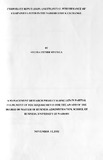Corporate reputation and financial performance of companies listed in the Nairobi Stock Exchange

View/
Date
2010-11-15Author
Otunga, Sylvia I
Type
ThesisLanguage
enMetadata
Show full item recordAbstract
The PriceWaterhouseCoopers has been carrying out surveys on CEO’s Most Respected
Companies in East Africa since 1999. These companies also continue to showcase their
financial soundness as they have been profitable over the years. No study has been
undertaken to date to establish the link between these companies’ reputation and their
financial performance in Kenya. A study on Kenya is necessary because the business
environment in Kenya is quite different from those of the developed nations where
studies on reputation have been carried out before. The objective of this study was to
establish the relationship between company’s corporate reputation and financial
performance.
This was a relational study of listed companies on the Nairobi Stock Exchange market.
The target firms were the 56 firms listed on the NSE. The respective companies were
asked to identify their major customers who were approached to take part in the study.
Thus, there were 140 employees and 140 customers in the final sample size. Data was
collected using questionnaires. These questionnaires were administered using drop and
pick later method. Secondary data, especially the financial performance were obtained
from the companies’ financial statements. Descriptive statistics such as mean scores and
standard deviations were used to analyze data using the SPSS. Further, correlation
analyses were used to establish the relationship between the independent variable and
firm performance as measured by sales growth and return on assets.
The study found no significant differences between employee and customer view of
corporate reputation. The study also found that the corporate reputation gap for firms
listed on the Nairobi Stock Exchange is low. It was also noted that corporate reputation
influenced both future sales and return on assets but these relationships were
insignificant. The study concludes that when the employee perception of the firm
reputation exceeds that of the customers (positive gap), there is much more favorable
company performance and the converse is also true.
These results have several important implications. The results reveal that it is
shortsighted to focus entirely on projects designed to increase reputation among
consumers, as marketing managers may do. There is also need to question the previous
emphasis on alignment between consumer and employee perceptions. This study suggests
that the alignment of affective associations between employees and customers should be
seen in a very different way. If, over time, employee perceptions can be consistently kept
above those of customers, this and not the alignment of the two are optimal.
Citation
MBA ThesisSponsorhip
University of NairobiPublisher
School of Business, University of Nairobi
